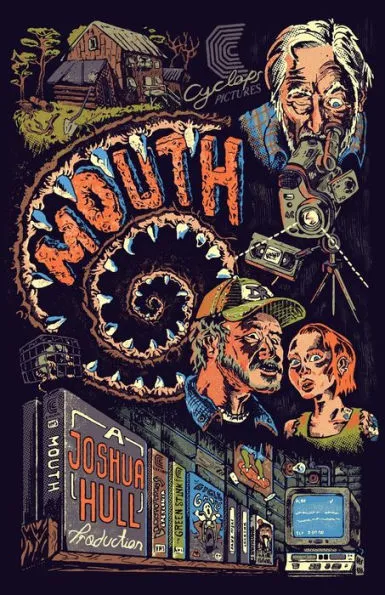
Synopsis:
After a stranger leaves him a secluded property, drifter Rusty finds himself the caretaker of a massive, tooth-filled mouth in the ground…and it’s hungry.
His situation is complicated by Abigail, a wannabe filmmaker who stumbles on the secret. Together, the odd pair set out to discover the origins of Mouth and the hidden history of its former owner, setting in motion an outlandish scheme that could endanger them all.
Review:
The jacket copy for Joshua Hull’s novella, Mouth, really tells you everything you need to know plot-wise: a drifter inherits a house, complete with property, truck, and a sentient hole in the ground lined with teeth. Rusty isn’t a character with many resources–physical or mental– but he has a fairly attuned sense of right and wrong. So when he learns that he’s become caretaker to a carnivorous monster, he is, shall we say, troubled.
Abigail, his teenage runaway sidekick, is considerable less troubled by ethical concerns, and she sees Mouth as a way, at first, to clean up the local trash, and later, to expiate past sins and start again.
None of this makes a ton of logical sense, but there’s little about Mouth that asks to be engaged with at a rational level. It’s pure B-Movie trash elevated by a core of human emotion. It’s hokey horror with heart.
It also takes some time to investigate just what we mean by the term “Monster,” riffing on Frankenstein, Jekyll and Hyde, The Blob, and a whole host of filmic and literary antecedents, the upshot being that the real monsters are human, and sometimes they’re us. It’s not a particularly new observation, but it does allow for signs of character growth in a story that has only so much space for such concerns.
That might sound like a gripe, but Mouth is exactly what it means to be: goofy, lighthearted, sometimes gross, and unapologetically sentimental. There’s a late-show glee to the proceedings that’s infectious, and if Rusty and Abigail aren’t exactly well-rounded characters, they are certainly well-drawn types, moving the action forward and building toward a feel-good conclusion that’s pretty effective.








Leave a Reply